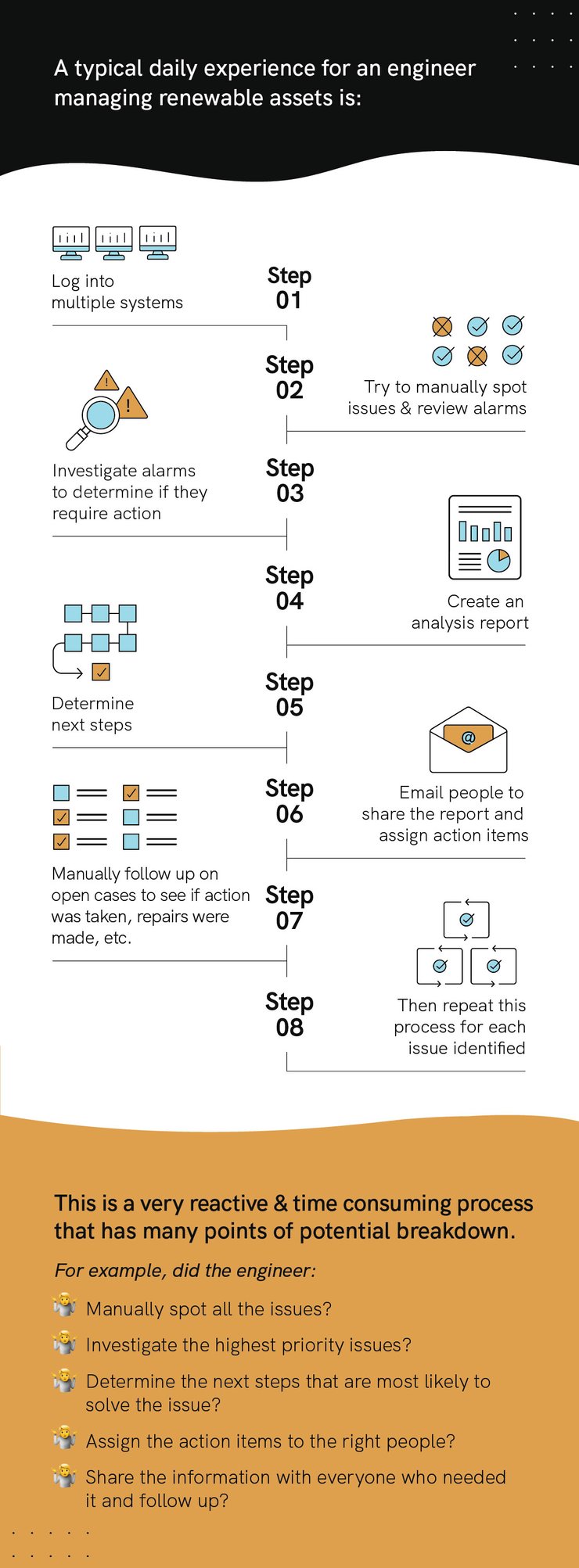Making Renewables Work Better for Europe
The past few years have seen incredible growth in worldwide renewable energy installations.
In 2021, electricity generated from renewable sources in the EU alone reached a new high of 1068 TWh, a 9% (+88 TWh) increase compared to 2019. Renewables accounted for 37% of EU electricity production in 2021, up from 34% in 2019.
Renewable expansion and self-sufficiency -: how self-sufficient operations are leading the way.
In addition to the natural growth of renewable energy, we are seeing many country and regional led new commitments being signed up to, such as the recent offshore wind pact signed between Germany, Denmark, Netherlands and Belgium, with a value of €135bn. This is fantastic news for the renewable sector operations, but can be disastrous if they aren’t prepared to efficiently handle the growth. Adding capacity just adds monitoring noise and often has engineers in reactive mode—dealing with unexpected downtime and repairs. If engineering isn’t highly efficient in how they manage assets, adding more assets requires adding more people and often results in more downtime. This means profit margins decrease as they grow.

The best way to meet the demands of capacity growth efficiently is by going beyond monitoring to intelligent automation. This article will discuss why current monitoring doesn’t scale and how intelligent automation can fix it so you
can grow with confidence.
Why today’s energy operations don’t scale efficiently:

What is intelligent automation for energy operations?
Intelligent automation is software that removes the inefficiencies from asset management—both from the standpoint of technology and people processes. Here are some of the key features of intelligent automation that specifically remove operational inefficiencies.
-
- Single pane of glass - Intelligent automation integrates multiple data sources for a single view of monitoring data. This streamlines the process for the engineer and provides richer information since it is all located in one place, from a single login.
- Automated engineering processes - Instead of relying on engineers to manually detect, troubleshoot, and decide next step actions, intelligent automation focuses on automating this process so that engineers can focus on exceptions.
- Prioritizes issues - Intelligent automation brings to the surface the highest priority issues so that engineers don’t have to spend their time sifting through alerts. It also provides actionable insights and automates decisions so that investigation and validation are a simple process.
- Manages collaboration - Communication is one of the biggest inefficiencies of operations. Intelligent automation keeps all the right people informed and taking appropriate actions by putting actionable information right at their fingertips. This includes easy access to insights as to the best corrective actions and most likely root causes.
By automating both the human and technology of managing energy assets, the valuable time of engineers is better spent toward proactively managing potential issues—thereby reducing downtime.
How intelligent automation enables capacity growth

Tactical outcomes of intelligent automation:
-
- Engineers get less alert noise and can manage the important alerts they do get much more efficiently because they have appropriate context to quickly investigate.
- Engineers can catch issues sooner thanks to automation of detection and analytics.
- With earlier detection and predictive analytics, downtime can be reduced and consumption can be optimized.
Investing in intelligent automation creates tangible value that allows operators to scale efficiently. As new installations occur, it must be a priority to optimize operational efficiency or else the inefficiencies will be magnified.
How can Intelligent automation help your operations to scale efficiently?
Thanks to the incredible demand of renewable energy combined with the influx of investment from the U.S. government, it is a great time to scale operations. But if you are unsure if your operations are efficient enough to scale confidently, consider asking your team the following:
-
- Do you log into multiple monitoring systems to try to get a picture of performance?
- Do you get a high volume of useless alerts?
- Do you have the information you need to easily investigate and prioritize issues?
- Do you feel issues could “fall through the cracks”?
- How much time do you typically spend on communications to resolve issues?
- How often are delays caused by poor communication?
- Are you able to leverage our data to improve operations and processes?
If your team is answering yes to even a few of these questions, it makes sense to look further into intelligent automation. Improving efficiency helps you to scale, but the real value is in reducing downtime and improving asset performance in production. This is what really keeps profitability high—no matter how much generation you are managing.